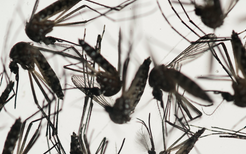The Arkansas Department of Health will use a $1.3 million grant from the Centers for Disease Control and Prevention to battle the Zika virus by studying the mosquito that carries it, a public health official said Friday.
Once the grant is officially announced, department officials will have the recommended breakdown for how to use the money, said Sue Weinstein, state public health veterinarian.
The CDC erroneously announced Thursday that Arkansas would receive $5.6 million in grant money but corrected the amount in a news release Friday.
The money will come from a $60 million grant split among states, cities and territories to fight the Zika virus, according to the news release.
The Zika virus is spread through mosquito bites or sexual transmission. Symptoms usually last about a week and can include a fever, rash, joint pain and itchy eyes, according to the Arkansas Department of Health website.
Much of Arkansas' share of the money will go to laboratory improvements and staff. Department officials hope to pay the salaries of four staff members -- an epidemiologist, an environmental program coordinator, a microbiologist and an administrative specialist, Weinstein said.
Part of the grant will pay for new equipment needed for the employees, such as desks and computers, Weinstein said.
The staff members will study the aedes genus of mosquito, which is present in Arkansas. It also carries the dengue virus, yellow fever and the Chikungunya virus.
"There's always another emerging disease," Weinstein said.
The insect will be studied through increased mosquito surveillance and trapping.
Staff members responsible for that will have mosquito repellent paid for by the grant, Weinstein said. They also will have access to new lab equipment to help with the mosquito study.
The department hopes to enlist the help of state universities through $45,000 subgrants. Officials are in talks with Arkansas Tech University in Russellville, the University of Arkansas for Medical Sciences in Little Rock and Arkansas State University in Jonesboro, she said.
Department laboratories also will get more equipment for Zika testing. Although there have been only six cases of Zika in the state, the department has evaluated 145 people for the virus, she said.
Zika is a threat to fetuses because, if their mothers contract the virus, the children can suffer brain defects, eye defects, hearing loss or impaired growth, according to the CDC website.
The state Department of Health has tested 79 pregnant women for the virus, Weinstein said. Because of health privacy regulations, the department would not release whether the women had the virus, said Meg Mirivel, a spokesman for the department.
Part of the grant money will go toward encouraging use of the U.S. Zika Pregnancy Registry, which state and local health departments can use to provide data on pregnant women who have the virus.
"I'm older, so I'm not worried about Zika," Weinstein said. "If I were of childbearing age, I would be."
There have been 1,403 travel-associated cases of the Zika virus in the United States since 2015. None has been acquired locally, according to the CDC website.
If there is a case of local transmission in Arkansas, the grant will help to pay for outside professional help, Weinstein said.
This is the second grant the CDC has distributed to states, cities and territories this month. The first was for $25 million. The CDC plans to divide another $10 million Aug. 1, according to the news release.
Metro on 07/23/2016
